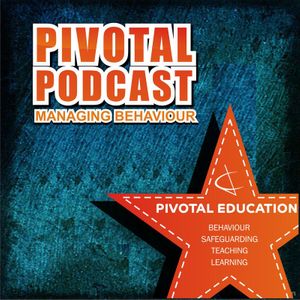Where The Wild Things Are With Kate Milman – PP189
Pivotal Podcast - A podcast by Pivotal Education

Categories:
Ollie spoke to Kate Milman this week from Wild Things Ecological Education Collective. The organisation has been running as a small grassroots and voluntary managed, not-for-profit social co-operative since 1997, working in the woodland environment with children and young people from Nottingham and Derbyshire. Wild Things provides woodland based environmental learning adventures, Forest School programmes, residential camps in the Derbyshire countryside, and co-operative challenges in the natural world for children and young people aged between 4-21 years old. They work with schools, alternative education provisions, play schemes and youth groups. Over the last 20 years they have been able to help thousands of children and young people access positive and high impacting experiences in the natural world. Wild Things specialises in working with children and young people who are classified as being “in need” and who are facing severe disadvantage in their lives, and as a result need extra emotional, social or learning support to reach their full potential. We help schools, and their children in need, to access our provision by securing funding from small funding bodies and Trusts. The majority of the children that they work with live in areas of inner city Nottingham that are effected by multiple deprivation and that are heavily urbanised. Most of the children who come out to Wild Things will have never set foot in a woodland before. What are the benefits to being outside for learners from inner city areas or elsewhere? Kate believes that there are many benefits. Often teachers tell her that they just don’t recognise the learners when they are in the woods. A lot of this is to do with space – it sounds different because of a lack of cars or people shouting and it also looks different – many of the children Wild Things works with will never have seen a view before, never looked out across a landscape. Learners love the diversity of what they are seeing – the moving branches and the different colours, for example. “Having the freedom to be a child again is a massive thing.” In the wood, you can make noise, you can move your body, you can explore, climb a tree and explore. More often nowadays children are driven from place to place and plugged into computers and phones. However, our ecology, our imaginations and everything which makes us human hasn’t changed and so a chance to be kids again is one of the main aims of the organisation. Do these changes transfer back into the classroom after the 6 week programme? Even two or three weeks into a programme, teachers already feedback to Kate about the impact the programme is having on learners. This is especially true for those children who are very quiet or have friendship difficulties. This is partly down to the collaborative nature of the work in the woods. The fact that teachers are there with the children also has a big impact as they get to see the children achieve very differently to back in school. There is not necessarily any correlation between behaviour or achievement in the two settings. Kate puts some of this down to the change in environment as well as the fact that the Wild Things staff don’t have any preconceptions about the learners. Expectations are set right at the beginning and trust has to be established quickly because of the safety aspects of learning outdoors. They also find that the vast majority of the children are highly motivated by the tasks and situations. Other improvements Kate has witnessed in learners include improved time-keeping, self-esteem and, therefore, behaviour. Do listne to the whole episode for lots more helpful advice and encouragement! [email protected]